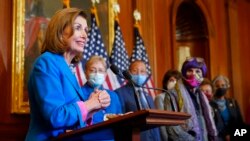The House and Senate voted Thursday afternoon in favor of stopgap legislation to keep the government funded until Dec. 3, avoiding a midnight shutdown.
The Senate vote was 65-35, which was followed by a House vote of 254-175. President Joe Biden signed the legislation into law Thursday night at the White House.
The legislation maintains current funding levels across government agencies. It also includes $28.6 billion for states suffering from hurricane and wildfire damage, and $6.3 billion to help relocate Afghan refugees moving to the United States after Washington ended its two-decade war in Afghanistan last month.
Avoiding a shutdown was just one item on a busy congressional agenda.
Late Thursday the House delayed a vote on a trillion-dollar infrastructure plan to repair the country's aging roads and bridges and expand broadband internet service throughout the United States.
House Speaker Nancy Pelosi had planned to hold the vote late Thursday, even though some progressive Democrats have promised to vote against it unless they receive assurances that political moderates in their party and two key centrist senators, Joe Manchin and Kyrsten Sinema, will also support a separate $3.5 trillion measure to greatly expand the country's social safety net programs.
The White House said an agreement was closer than ever, but that more time was needed to get a deal on President Biden’s agenda. The bipartisan legislation has already been approved by the Senate.
Senate Republicans earlier this week blocked passage of another measure to avert the possible partial government shutdown because it also included a provision to suspend the country's long-term debt limit, which they are trying to force Democrats to adopt on their own without Republican support.
But Senate Republican leader Mitch McConnell said Republicans would support a measure that deals only with the funding package to keep the government open into the new fiscal year that starts Friday.
There have been 21 partial U.S. government shutdowns since 1976, including three during the single four-year White House term of President Donald Trump.
By law, U.S. government agencies must have congressionally authorized funding to operate. Shutdowns have usually occurred when Congress and the White House cannot agree on funding levels for specific operations or whether the programs in question deserve to be funded at all.
Without funding during the shutdowns, many government operations have been halted, such as pension payments to older Americans, the processing of income tax refunds and accessibility to national parks. National security operations, however, have been deemed essential, and workers have stayed on the job even though their paychecks might be delayed.
Additionally, Pelosi told Democratic colleagues the House would vote soon on suspending the national government's debt limit.
Even if the House passes the legislation, though, its fate in the politically divided Senate, with 50 Republicans and 50 Democrats, is uncertain.
Senate Republicans already twice this week have rejected efforts to suspend the debt limit, saying it is an effort by opposition Democrats to clear the path for the massive new spending plan to expand social safety net programs, the most since the 1960s.
Republicans uniformly oppose the Democratic proposals championed by Biden.
Treasury Secretary Janet Yellen told congressional leaders on Tuesday that the government would likely run out of money to pay its bills by October 18 if Congress did not suspend the debt limit or raise it substantially beyond its current $28.4 trillion total.







